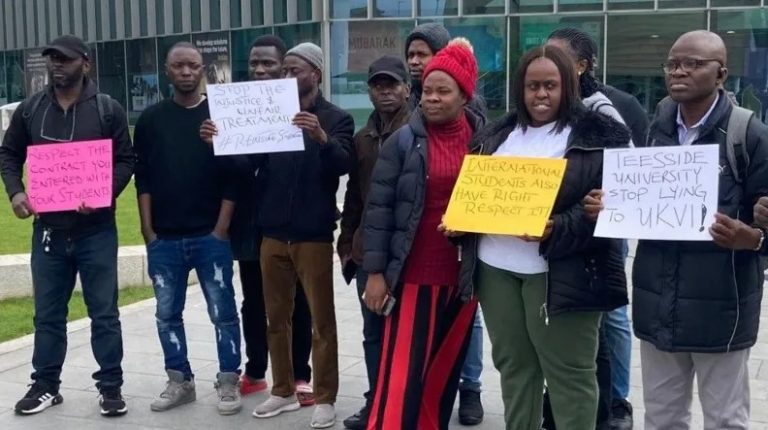Several Nigerian students enrolled at Teesside University in the United Kingdom were recently removed from their academic programs and ordered to leave the country due to difficulties paying tuition fees on time.
The BBC reports that the issue stems from the devaluation of the Nigerian naira, making it challenging for the students to meet their financial obligations.
According to the report, this situation has resulted in a breach of the students’ visa sponsorship requirements. Consequently, the university blocked their access to educational resources, reported them to the Home Office, and initiated deportation proceedings.
The affected students expressed frustration and disappointment with the university’s handling of the situation. They accused Teesside University of being unsympathetic and failing to provide adequate support during their financial hardship.
A group of 60 students spoke out to the BBC, urging the university for more leniency after witnessing the severe consequences faced by their peers who defaulted on payments. These students were abruptly locked out of their university accounts and forcefully withdrawn from their courses.
One student, Adenike Ibrahim, who was nearing graduation, recounted having her visa revoked despite paying 90% of her tuition fees. “I did default [on payments],” she admitted to the BBC, “but I’d already paid most of my fees and attended all my classes. I tried to reach an agreement with the university, but they seemed unconcerned about the students’ well-being.”
Another student, Esther Obigwe, shared her struggles with depression due to the situation. Obigwe claimed she repeatedly contacted the university regarding her financial constraints but received no response until her academic access was revoked and she was issued a deportation notice.
“I actively participated in all classes and seminars,” Obigwe emphasized. “It’s disheartening. I’m now on antidepressants, and being alone here, I have no one to talk to. For the past two months, I’ve barely eaten or slept. We didn’t do anything wrong; I don’t understand why this is happening to us.”
Jude Salubi, a social work student abruptly informed of his program suspension and deportation requirement despite being in the middle of a crucial placement. Salubi revealed working long hours to cover his outstanding fees and expressed willingness to create a feasible payment plan to settle the balance.
Teesside University, in response to the BBC’s inquiries, acknowledged its obligations regarding visa sponsorship and compliance with strict immigration regulations. The university’s spokesperson highlighted its efforts to support international students facing financial difficulties by offering customized payment plans. However, they conceded that some students defaulted on these revised agreements.
The Home Office clarified that the decision to grant or revoke visa sponsorships rests with the sponsoring institution. In cases of visa termination, the Home Office advises individuals to either regularize their immigration status or depart the UK.



